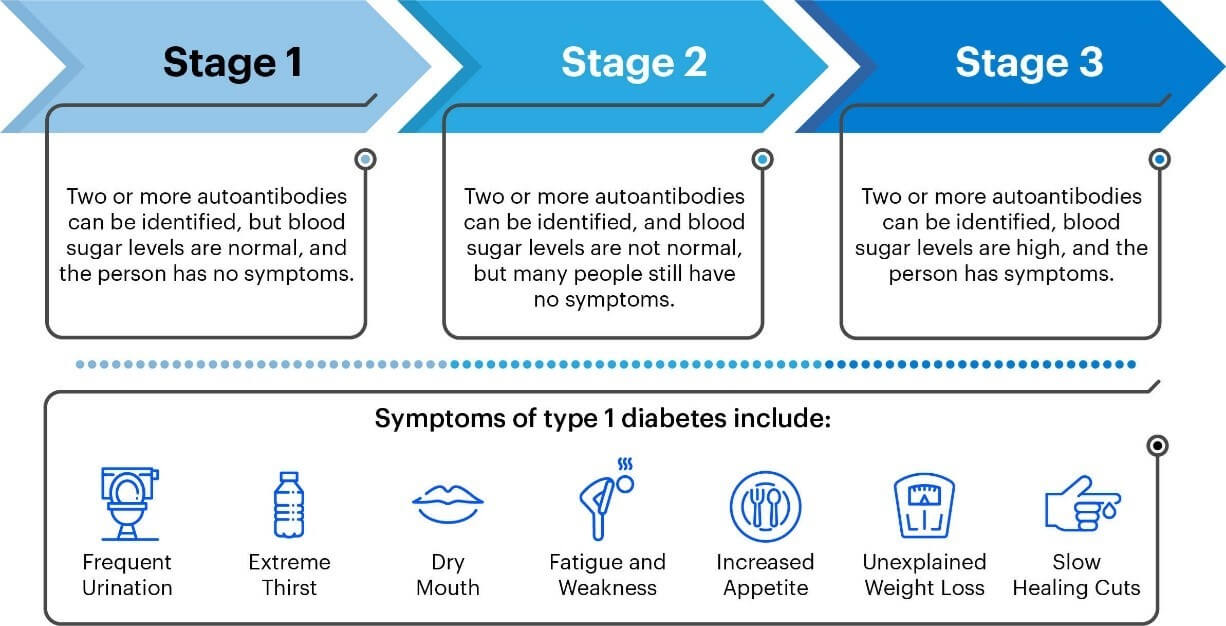Predicting and Planning for Type 1 Diabetes: Advances in Screening and Monitoring
Jun 22, 2022, 11:38 AM
By Anastasia Albanese-O’Neill, PhD, APRN, CDCES
Director, Community Screening & Clinical Trial Education
JDRF
Each year in the United States, nearly 50% of children and adolescents experience diabetes-related ketoacidosis (DKA) at the time of their type 1 diabetes diagnosis. The very young, racial/ethnic minorities, and children who are publicly insured are at higher risk for DKA. The presence of DKA at diagnosis predisposes children for poorer health outcomes over time, including a higher lifetime A1C and negative impacts to IQ and memory.
Simultaneously, nearly 40% of adults with type 1 diabetes are initially misdiagnosed with type 2 diabetes and may not be prescribed an appropriate medical regimen or receive adequate diabetes education.
The fact that 9 out of 10 people with type 1 diabetes have no family history is part of the challenge. For most people, a diagnosis of type 1 diabetes simply isn’t on the radar. Most do not know or recognize the symptoms, including thirst, increased urination, hunger, weight loss and fatigue, so diagnosis is delayed. In adults, the symptoms can develop insidiously over time.
Thanks to decades of research in type 1 diabetes autoantibody screening,* we know that the immune system mediated destruction of the insulin-producing beta cells in the pancreas begins long before insulin is required. In fact, current clinical guidelines provide for pre-symptomatic staging of type 1 diabetes. This staging can be used to predict the risk of type 1 diabetes over time based on the number of autoantibodies and blood glucose levels. The diagnostic criteria for the stages of type 1 diabetes are:
 Image courtesy of JDRF
Image courtesy of JDRF
-
Stage 1: Multiple islet autoantibodies present, no impaired glucose tolerance (IGT) or impaired fasting glucose (IFG).
-
Stage 2: Multiple islet autoantibodies present, IGT (2-hour plasma glucose 140-199 mg/dL) and/or IFG (100-125 mg/dL) and/or A1C of 5.7-6.4 or ≥10% increase in A1C.
-
Stage 3: Clinical type 1 diabetes diagnosed by standard criteria.
These staging criteria help us predict and plan for progression to a type 1 diabetes diagnosis. When multiple autoantibodies are detected, the lifetime risk for developing type 1 diabetes approaches 100%, with 44% progressing to a diagnosis within 5 years and 70% within 10 years.
How can diabetes care and education specialists use this knowledge in their practice setting?
- Provide individuals with information about the other screening options available in the United States. You can learn more about these and other programs by visiting JDRF’s T1Detect webpage, which includes links to all the U.S. based screening programs.
-
Teach people that screening alone is not enough. Evidence shows that close monitoring is key to reducing the likelihood of DKA at diagnosis. The Ask the Expert Program provides advice about screening and monitoring for health care providers, diabetes care and education specialists, and individuals and families.
-
Educate people who test positive for autoantibodies about the symptoms of type 1 diabetes. The graphic below can be used to communicate type 1 diabetes staging and symptoms.
-
Share information about type 1 diabetes prevention studies and the related benefits. You can learn more about this topic at ADCES22 in Baltimore during the session entitled, Pre-symptomatic Type 1 Diabetes: Staging, Screening, and Monitoring. Register today for ADCSE22 in Baltimore.
*Type 1 Diabetes Autoantibodies include Insulin Autoantibody (IAA), Glutamic Acid Decarboxylase (GAD), Islet Antigen 2 (IA2), and Zinc Transporter 8 (ZNT8)
References
Insel RA, et al. Staging presymptomatic type 1 diabetes: a scientific statement of JDRF, the Endocrine Society, and the American Diabetes Association. Diabetes Care. 2015;38(10):1964-74.
Sims EK, et al. Screening for Type 1 Diabetes in the General Population: A Status Report and Perspective. Diabetes. 2022;71(4):610-623.
Bao YK, Ma J, Ganesan VC, McGill JB. Mistaken Identity: Missed Diagnosis of Type 1 Diabetes in an Older Adult. Med Res Arch. 2019;7(8):1962.
American Diabetes Association Professional Practice Committee. Standard of Medical Care in Diabetes – 2022. Diabetes Care 2022;45 (Suppl 1): S1-S264.
ADCES Perspectives on Diabetes Care
The Association of Diabetes Care & Education Specialists Perspectives on Diabetes Care covers diabetes, prediabetes and other cardiometabolic conditions. Not all views expressed reflect the official position of the Association of Diabetes Care & Education Specialists.
Copyright is owned or held by the Association of Diabetes Care & Education Specialists and all rights are reserved. Permission is granted, at no cost and without need for further request, to link to, quote, excerpt or reprint from these stories in any medium as long as no text is altered, and proper attribution is made to the Association of Diabetes Care & Education Specialists.
HEALTHCARE DISCLAIMER: This site and its services do not constitute the practice of medical advice, diagnosis or treatment. Always talk to your diabetes care and education specialist or healthcare provider for diagnosis and treatment, including your specific medical needs. If you have or suspect that you have a medical problem or condition, please contact a qualified health care professional immediately. To find a diabetes care and education specialist near you, visit DiabetesEducator.org/Find.